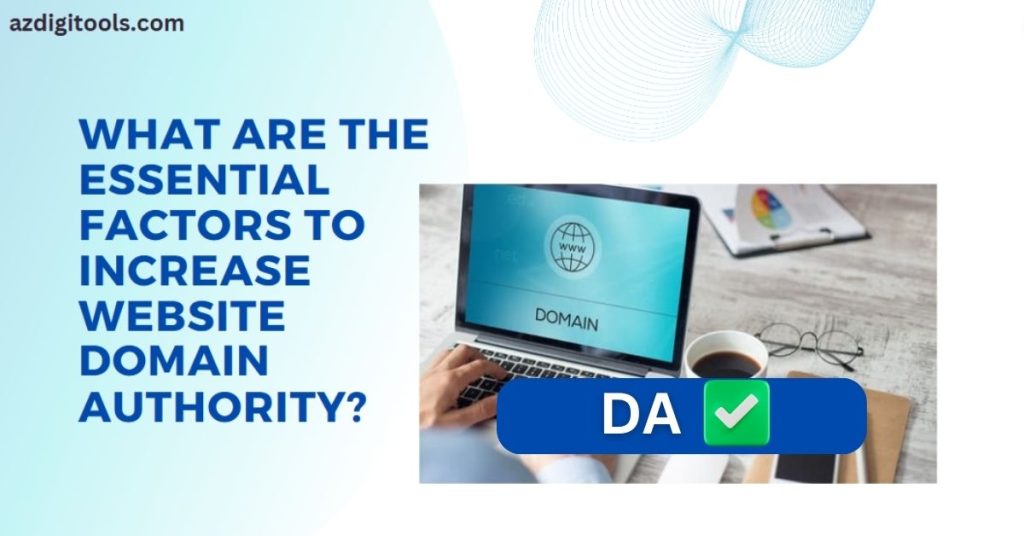
Domain authority (DA) is an integral SEO metric to understand and work toward. While not directly correlated with search engine rankings, DA serves as a powerful indicator of your site’s ability to perform well on search engines.
Website Domain Authority, unlike PageRank, which Google once publicly displayed, is calculated on a logarithmic scale, making it much easier for websites to increase their DA than their PR score.
7 Essential Factors to Increase Website Domain Authority
1. Quality Backlinks and Link Profile
Domain authority (DA) is a measure of how well a website ranks in search engine results pages (SERPs). The higher its DA score is, the greater its chances of being discovered online.
To increase your domain authority score, focus on improving the quality of content production, backlink profile management, and overall visibility for greater results.
An important component in calculating your Domain Authority (DA) score is the number and quality of links pointing back to your website.
Furthermore, to prevent spammy links, regular link audits should be performed, and any suspicious sites that attempt to artificially increase DA scores should be disavowed immediately.
Relevant and informative content creation can help boost your Domain Authority. Publishing this type of material on an ongoing basis to keep your audience engaged will also attract quality backlinks that support and increase it.
Domain age also affects this score – older sites with proven compliance with search engine guidelines tend to score higher on this metric than newer websites.
2. Content Excellence and Relevance
Domain authority (DA) is a score on a 100-point scale that predicts how well a website will rank in search engine results pages (SERPs).
However, it should be kept in mind that this score is relative; sites with lower domain authority scores could still rank highly for certain keywords even though competitors might boast higher DA scores.
Moz, the developer of domain authority, designed this metric to assist digital marketers in judging a website based on various SEO factors. While not a Google ranking factor itself, various tools may use their methodologies for calculating it.
To improve your Domain Authority (DA), ensure all the content on your website is relevant and of high quality. Use keywords relevant to search engines when writing, as well as long-form articles linking back to authoritative sites.
Engage in broken link building by identifying existing broken links on other websites that need replacing with fresh new content on your website.
3. Technical SEO and Site Health
Domain authority is one of the key metrics you should keep in mind if you want your website to rank highly in search engines, according to Moz. This metric indicates how authoritative your site is and can serve as a direct indicator of search engine ranking potential.
As such, if you want your website to appear in search results on page one (SERPSs), improving domain authority is key. There are various strategies available to you for doing this, such as producing high-quality niche-relevant content that attracts links from other websites or broken link building, where broken links on other sites are identified and then replaced with relevant content produced to replace them.
An additional way to increase your Domain Authority (DA) score is by getting listed in directories and citations, which will also increase visibility. You must keep tabs on your DA score so that adjustments can be made as needed – particularly as Google’s ranking algorithm frequently changes.
4. Social Signals and Brand Visibility
Domain Authority (DA) is a metric used by Moz to predict how a website may rank in search engine results pages, providing an indicator of your overall health and SEO strength. A higher DA score typically leads to better search rankings; however, this doesn’t always hold.
Moz also takes into account other factors when calculating domain authority scores for websites, such as social signals and the number of referring domains. As a result, domain authority scores may fluctuate over time; however, there are proven strategies available that can increase your domain authority score and boost search engine rankings.
Be mindful that domain authority (DA) alone doesn’t hope for success for a website and shouldn’t be the main focus. A low or average DA website may still rank highly if it provides high-quality content and targets low-competition keywords.
Furthermore, there are ways you can boost its DA without breaking Google’s rules on link building; here are a few techniques:
5. User Experience and Engagement Metrics
Domain Authority (DA) is a relative metric utilized by SEO services and tools like Moz to assess the strength and ranking potential of websites. It considers factors like backlinks, performance optimization, and user experience, with its final determination being decided via an advanced algorithm that considers multiple variables.
Use of quality, engaging content that delivers value to your target audience can significantly increase your DA and improve search engine results pages. Furthermore, optimizing mobile responsiveness and the speed of loading websites are key elements to maintaining and increasing DA scores.
Not to be mistaken with Domain Authority (DA), this metric isn’t used by search engines to rank sites; rather, it serves as an invaluable way of understanding competitive positioning and developing SEO strategies that meet them.
With proper data in hand, increasing DA can be accomplished even for smaller sites or websites just starting.
6. Consistency and Authority Building
Domain authority (DA) is one of the key metrics in SEO, and increasing it can play a pivotal role in increasing a website’s visibility. A higher DA score can result in improved rankings that, in turn, drive traffic and conversions – be they trial signups, phone calls, or purchases.
Tools like Moz’s Domain Authority (DA) and Ahrefs’ DR can help provide insight into where your website stands against others. These predictive metrics indicate how likely it is for a site to rank well on search engine results pages (SERPs).
However, it should be remembered that Domain Authority only correlates to search rankings when taken in conjunction with keywords; it doesn’t allow first place for every keyword search term.
For instance, my earlier example website, with an average domain authority of 55, currently ranks second (behind Wikipedia) for an extremely competitive search term with 19 million results and third overall for another related search term with 24 million.
What matters in the end is creating an effective online presence that demonstrates your expertise and relevancy within your niche market.
7. Monitoring and Adaptation
Domain authority (DA) is an essential metric that gives an idea of how well your website will rank in search engines, giving a good indication of its chances of ranking on search engine results pages (SERPs).
A high DA score increases your chance of appearing on page one, increasing chances of appearing there and ultimately being found by visitors’ search engines.
Raising your domain authority takes time and dedication. While you might not see significant increases overnight, your DA will certainly show improvements over time.
One of the keys to building domain authority is creating quality content that is useful and educational. This will draw in visitors while helping your brand.
Furthermore, pay close attention to technical aspects of your website, such as mobile-friendliness that complies with Google Page Speed guidelines; keep tabs on your competitors’ domain authority to identify opportunities; monitor them to improve strategy; use open source tools like Lighthouse and PageSpeed Insights for monitoring website performance evaluation – these may all play a part.
Final Words
Domain authority (DA) is an essential metric that predicts your website’s ability to rank well on search engine results pages. Moz and similar tools use an intricate algorithm that takes several factors, including backlinks, into consideration when calculating domain authority scores for websites.
Growing your domain authority takes time and dedication, but there are a few effective strategies you can employ to make the process simpler. Producing quality content, building high-quality backlinks, and optimizing for performance are all vital parts of increasing domain authority.
Social signals and brand visibility can also help your domain authority. Blogger outreach, reaching out to bloggers and publications who may link back to your content, is an effective strategy for this. Submitting it to directories like the Google Search Console or Bing Webmaster Tools also increases DA.
Overall, to increase domain authority is through constantly reviewing and altering your strategy. Be persistent and patient as your DA score steadily climbs!





